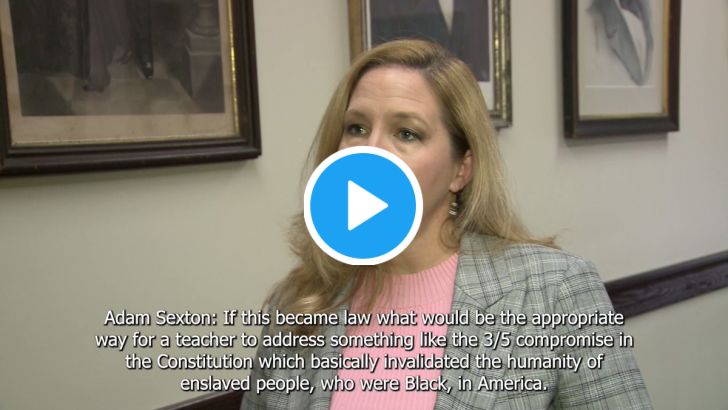New Hampshire bill would require teachers to put a positive spin on slavery
In March 2020, as the pandemic took hold of the United States, I decided to take down Popular Information's paywall. For the last year and a half, every edition of Popular Information has been available for free. I made that decision for a couple of reasons:
I’m not sure when the pandemic will end, but I'm hoping to be able to keep this newsletter free for as long as possible. Subscriptions, however, are Popular Information's only source of revenue. So here is the deal: For every 30 people that sign up for a paid subscription today, I will keep the paywall down for everyone for another month. Your support will help keep Popular Information's groundbreaking accountability journalism accessible to everyone and maximize its impact. If the cost of this newsletter ($6/month or $50/year) would create any kind of financial strain, please stay on this free list. But, if you can afford it, please consider becoming a paid subscriber. What is being promoted as an effort to stop Critical Race Theory (CRT) from indoctrinating K-12 students is actually a push to censure truthful information about American history. A new "teacher loyalty" bill introduced in New Hampshire would, among other things, prohibit "teaching that the United States was founded on racism." A reporter for WMUR, the ABC affiliate in New Hampshire, asked one of the bill's sponsors, Representative Erica Layton (R), how a teacher could "address something like the Three-Fifths Compromise in the Constitution which basically invalidated the humanity of enslaved people who were black" if the new legislation became law. The reporter noted that's a "racist aspect of America's founding."   Layton said that teachers should explain that the 3/5ths compromise was an effort to end slavery, which Layton said was "already on the way out." The only problem with this solution is that it's not true. Scholars agree there is "no evidence the constitutional provision was intended to end slavery," which persisted for nearly a century after the Constitution was ratified. It conferred additional political power to states with large slave populations. In so doing, it helped entrench the institution of slavery. The same ahistorical argument was advanced by a lawmaker in Tennessee, Representative Justin Lafferty (R), earlier this year to support legislation banning CRT. The legislation is now law in Tennessee and, as Popular Information reported, is currently being invoked to try to prevent second graders from reading about Martin Luther King Jr. Layton herself acknowledged her historical "errors" in answering questions from WMUR but continued to defend the bill:  Erica Layon @EricaForDerry @AdamSextonWMUR Thanks to all that pointed out my errors, that is how we learn. HB1255 will not stop discussion in the classroom, it prevents a teacher from advocating one viewpoint. Teach how to think, not what to think.The New Hampshire bill also prohibits "any doctrine or theory promoting a negative account or representation of the founding and history of the United States of America in New Hampshire public schools which does not include the worldwide context of now outdated and discouraged practices." The primary sponsor of the bill Representative Alicia Lekas (R) told the Concord Monitor that this provision requires teachers to explain away slavery in the United States because it was ubiquitous worldwide:
This, again, is ahistorical. Long before slavery was abolished in the United States (1865), it was abolished in other countries, including Spain (1811), Mexico (1829), Britain (1834), and France (1848). The ACLU of New Hampshire says the bill is "unconstitutional" and "builds on the disturbing trend...of erasing America's legacy of racism and slavery." Teachers attempting to comply with the bill, should it become law, will be in a bind. If a teacher discusses the "worldwide context" of slavery on one day, can they discuss slavery in the United States without mentioning this context the next day? What about assigning a text that references slavery in the United States without including the "worldwide context"? These are not trivial matters. According to the legislation, teachers who violate these provisions "shall be considered a violation of the New Hampshire code of ethics and code of conduct for educational professionals" and will be subject to "disciplinary sanctions." The opaque nature of the restrictions is really the point. The legislation is designed to chill honest discussion of American history in the classroom. Putting teachers on a tightropeThe new bill builds on legislation that was enacted in New Hampshire over the summer prohibiting instruction on "divisive concepts." The primary sponsor of that legislation, Representative Keith Ammon (R), is also a sponsor of the new "Teacher Loyalty" bill. The law signed by Governor Chris Sununu (R) in June is more limited. It prohibits teaching "that one identified group" is "inherently racist, sexist, or oppressive." In doing so, it likely bans discussion of "white privilege" and related concepts. The language in the bill is based on an executive order issued by Trump which banned the use of federal funds to support instruction on "divisive concepts." Such concepts are not currently part of New Hampshire’s K-12 curriculum. The New Hampshire Department of Education says the law does not prohibit "the teaching of historical subjects" or "the historical existence of ideas." Teachers in New Hampshire, however, are concerned about the difficulty in threading this needle. Teachers told New Hampshire Public Radio that "students are always making connections to current events" and "making sense of the past by talking about the present." A teacher does not necessarily have the ability to prevent a discussion on historic discrimination from touching on the ways white privilege operates in society today. Such a discussion could lead to a complaint filed against the teacher with the New Hampshire Commission for Human Rights or the New Hampshire Office of the Attorney General. A teacher found in violation of the law may face "disciplinary sanction by the state board of education." A dark money pushThe push for anti-CRT legislation in New Hampshire is not happening in a vacuum. PEN America, a non-profit devoted to freedom of expression, has identified "54 separate bills" introduced in 24 states "intended to restrict teaching and training in K-12 schools, higher education, and state agencies and institutions." PEN America describes these bills as "educational gag orders." Ten of these bills have already become law. Last week, a constellation of dark money groups released a public letter calling for more legislation in 2022.
The letter called on states to pass laws banning "any idea that violates the Civil Rights Act of 1964." The Civil Rights Act of 1964, of course, does not ban ideas. It bans actual discrimination based on race, color, religion, sex, and national origin. Court rulings extended these protections to sexual orientation and gender identity. The anti-CRT movement is misrepresenting the meaning of the Civil Rights Act of 1964 to suggest it bans certain kinds of discussions about racism and discrimination. According to the signatories of the letter, "America should be defined as a nation that offers freedom and opportunity for everyone, regardless of the color of their skin." In other words, teachers should be required to define America as a place where racism and discrimination are no longer a salient factor in people's lives. The letter was released by the Heritage Foundation and signed by representatives from the Manhattan Institute, the Claremont Institute, Parents Defending Education, the Goldwater Institute, and Independent Women’s Voice. One thing these institutions all have in common is that they do not disclose their donors. |
Older messages
Inflation exposed: The REAL reason prices are going up
Thursday, December 2, 2021
A few weeks ago, Popular Information revealed how powerful corporations are driving inflation. Companies like Procter & Gamble and PepsiCo are not simply increasing prices to cover higher input
"Moms For Liberty" says book about MLK violates new law banning CRT in Tennessee
Wednesday, December 1, 2021
In May, Tennessee passed a law banning Critical Race Theory in K-12 schools. The state is already seeing the ugly consequences of the law. And things are likely to get worse. While Critical Race Theory
Olympic sponsors stay silent on Peng Shuai
Tuesday, November 30, 2021
On November 2, Peng Shuai, a Chinese professional tennis player who was once ranked #1 in the world in doubles, accused a powerful Chinese politician, Zhang Gaoli, of rape. "I never consented that
A tale of two thefts
Monday, November 29, 2021
In the United States, only certain types of theft are newsworthy. For example, on June 14, 2021, a reporter for KGO-TV in San Francisco tweeted a cellphone video of a man in Walgreens filling a garbage
These corporations back the sponsors of an Ohio abortion ban that's more extreme than Texas
Tuesday, November 23, 2021
In September, Texas enacted the nation's most extreme abortion ban. Two months later, legislators in Ohio are pushing an abortion ban that goes even further. And the bill has significant momentum.
You Might Also Like
Monday Briefing: How Trump re-wrote Jan. 6
Sunday, January 5, 2025
Plus, the end of an era for Hong Kong's cabbies View in browser|nytimes.com Ad Morning Briefing: Asia Pacific Edition January 6, 2025 Author Headshot By Justin Porter Good morning. We're
GeekWire's Most-Read Stories of the Week
Sunday, January 5, 2025
Catch up on the top tech stories from this past week. Here are the headlines that people have been reading on GeekWire. ADVERTISEMENT GeekWire SPONSOR MESSAGE: GeekWire's special series marks
For an organized closet
Sunday, January 5, 2025
Plus, how to donate clothes responsibly View in browser Ad The Recommendation January 5, 2025 Ad Today we'll walk you through some of our best advice for organizing your closet—and what to do with
Icy Roads, Popeye in the Public Domain, and Christmas Trees for Elephants
Sunday, January 5, 2025
Manhattan Judge Juan M. Merchan plans to impose no punishment for President-elect Donald Trump's hush-money conviction, given concerns about his immunity from criminal prosecution upon taking the
☕ No appetite
Sunday, January 5, 2025
A famed Roman fountain gets a new coat of paint... Morning Brew Presented By Huel January 05, 2025 | View Online | Sign Up | Shop A hot-air balloon rises during the international hot-air balloon
Can the U.S. outpace China in AI? Microsoft offers a blueprint
Saturday, January 4, 2025
What happens when AI teams up with a vintage drum machine ADVERTISEMENT GeekWire SPONSOR MESSAGE: GeekWire's special series marks Microsoft's 50th anniversary by looking at what's next for
Pompeiian Sugarplum
Saturday, January 4, 2025
Today, enjoy our audio and video picks. Pompeiian Sugarplum By Caroline Crampton • 4 Jan 2025 View in browser View in browser The full Browser recommends five articles, a video and a podcast. Today,
9 Things Christian Siriano Can’t Live Without
Saturday, January 4, 2025
From Camper boots to travel-size hair spray. The Strategist Every product is independently selected by editors. If you buy something through our links, New York may earn an affiliate commission.
YOU LOVE TO SEE IT: In With The Good Energy, Out With The Bad
Saturday, January 4, 2025
California looks to the renewable future, while New York probes the polluted past. In With The Good Energy, Out With The Bad By Sam Pollak • 4 Jan 2025 View in browser View in browser A wind turbine
The 6 best men’s jeans
Saturday, January 4, 2025
Lookin' good View in browser Ad The Recommendation January 4, 2025 Ad Men's jeans we love A person wearing a pair of jeans and a white tee shirt. Michael Murtaugh/NYT Wirecutter No other piece



